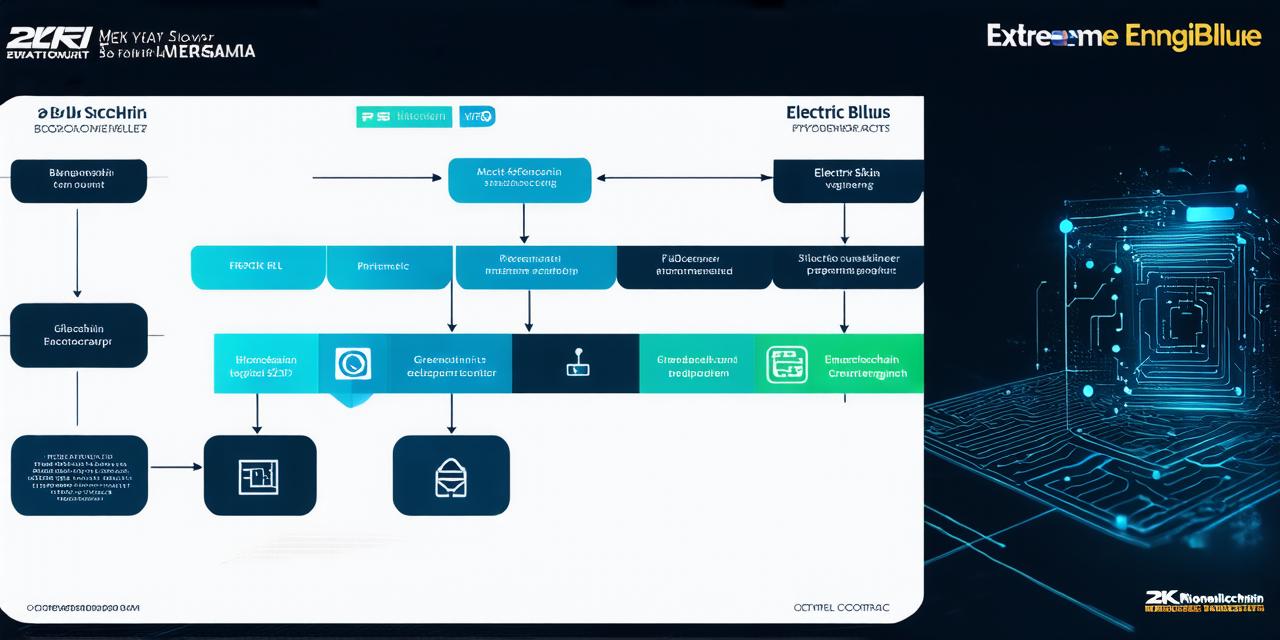Blockchain technology is revolutionizing the way we store and share data. With its decentralized, secure, and transparent nature, blockchain has become an essential part of many industries, from finance to healthcare to supply chain management.
In this article, we will provide a step-by-step guide on how to become a blockchain engineer. We will cover everything from the basics of blockchain technology to advanced skills and certifications that you need to succeed in this field. We will also discuss the benefits of becoming a blockchain engineer, including high salaries, job security, and the opportunity to work on cutting-edge technology.
Before we dive into the details, let’s take a look at some statistics that show how important blockchain technology is becoming. According to a recent report by MarketsandMarkets, the global blockchain market is expected to grow from $3.1 billion in 2020 to $39.7 billion by 2025, at a compound annual growth rate (CAGR) of 54.8%. This growth is driven by the increasing adoption of blockchain technology across various industries, including finance, healthcare, and supply chain management.
Step 1: Learn the Basics of Blockchain Technology
Before diving into the technical aspects of blockchain engineering, it is essential to have a solid foundation in blockchain technology. This includes understanding the basics of cryptography, distributed systems, and consensus algorithms. Some of the key concepts you need to master include:
- Blockchain architecture: Understanding how blocks are linked together and how data is stored on the blockchain.
- Cryptography: Knowing how to secure data using encryption and hashing techniques.
- Consensus algorithms: Understanding how nodes on the network agree on the state of the blockchain.
- Smart contracts: Learning how to write self-executing contracts that can be enforced on the blockchain.
- Decentralization: Understanding how blockchain technology allows for decentralized systems that are not controlled by any single entity.
There are many resources available online that can help you learn these concepts, including online courses, tutorials, and books. Some popular platforms for learning about blockchain technology include Coursera, Udemy, and edX.
Step 2: Choose a Blockchain Platform
Once you have a basic understanding of blockchain technology, the next step is to choose a platform on which to build your skills. There are several popular blockchain platforms to choose from, including Ethereum, Hyperledger Fabric, and Corda. Each platform has its strengths and weaknesses, and the choice will depend on your specific interests and goals.
For example, if you are interested in building decentralized applications (dApps), Ethereum is a popular choice due to its support for smart contracts and dApp development. Hyperledger Fabric is a good option if you are working with enterprise clients or need to build permissioned blockchain networks. Corda is ideal for building cross-border payments and supply chain management systems.
Step 3: Gain Hands-on Experience
One of the best ways to become a blockchain engineer is to gain hands-on experience by working on real-world projects. This can be done through internships, freelance work, or open-source contributions. Some popular blockchain projects that you can contribute to include:
- Ethereum: Contributing to the development of smart contracts and dApps on the Ethereum network.
- Hyperledger Fabric: Building permissioned blockchain networks using Hyperledger Fabric.
- Corda: Developing cross-border payments and supply chain management systems using Corda.
- Bitcoin: Contributing to the development of the Bitcoin network by fixing bugs, improving security, or building new features.
By working on real-world projects, you will gain valuable experience in blockchain engineering and have the opportunity to work with other developers and experts in the field.
Step 4: Earn a Degree or Certificate
While gaining hands-on experience is essential for becoming a blockchain engineer, earning a degree or certificate can also be helpful. There are many colleges and universities that offer blockchain engineering programs, and there are also several online courses and certifications that you can take to gain the skills you need.
Some popular blockchain engineering programs include:
- Carnegie Mellon University’s Heinz College: Offers a Master of Science in Cybersecurity and Risk Engineering with a focus on blockchain technology.
- Massachusetts Institute of Technology (MIT): Offers a course on Blockchain Technology that covers the basics of blockchain architecture, cryptography, and consensus algorithms.
- University of California, Berkeley: Offers a course on Distributed Systems that covers the fundamentals of distributed systems, including blockchain technology.
There are also several online certifications that you can earn to demonstrate your skills in blockchain engineering, such as the Certified Blockchain Developer (CBDM) certification from the International Association of Software Architects (IASA).
Step 5: Stay Up-to-Date with the Latest Technologies and Trends

The field of blockchain engineering is constantly evolving, with new technologies and trends emerging all the time. To stay up-to-date with these changes, it is essential to read industry publications, attend conferences and meetups, and engage in online communities.
Some popular resources for staying up-to-date with the latest developments in blockchain engineering include:
- CoinDesk: A leading news site covering the latest developments in the cryptocurrency and blockchain space.
- Medium: A platform for sharing ideas and insights on a wide range of topics, including blockchain technology.
- LinkedIn Groups: Join groups focused on blockchain technology to connect with other professionals in the field and learn about the latest trends and technologies.
Benefits of Becoming a Blockchain Engineer
There are many benefits to becoming a blockchain engineer, including high salaries, job security, and the opportunity to work on cutting-edge technology. Some of the key advantages of this career include:
- High Demand: With the growing adoption of blockchain technology across various industries, there is a high demand for skilled blockchain engineers. This means that you have a good chance of finding employment and earning a competitive salary.
- Job Security: Blockchain technology is still in its early stages, and there is significant potential for growth and innovation in this field. As a result, blockchain engineers are likely to have job security for the foreseeable future.
- Cutting-Edge Technology: Working as a blockchain engineer allows you to work on cutting-edge technology that is at the forefront of innovation. You will have the opportunity to design and develop systems that are secure, transparent, and decentralized.
- Professional Growth: The field of blockchain engineering is constantly evolving, and there is always something new to learn. By working as a blockchain engineer, you can continue to grow professionally and stay at the forefront of this exciting technology.
Conclusion
Becoming a blockchain engineer requires a combination of skills, including a basic understanding of blockchain technology, hands-on experience, and a degree or certification. However, with the growing demand for skilled blockchain engineers, there has never been a better time to pursue this exciting career.
